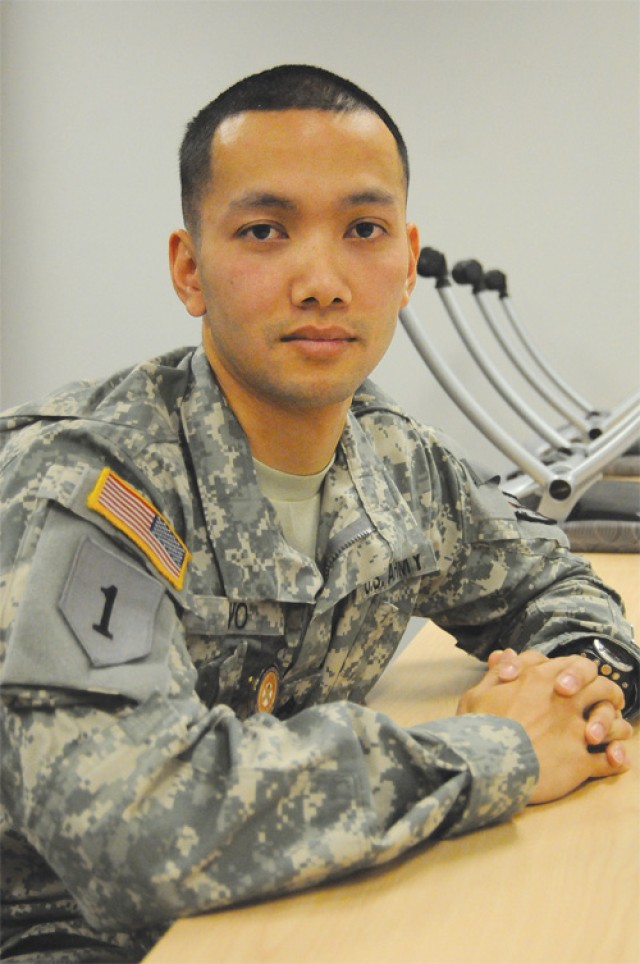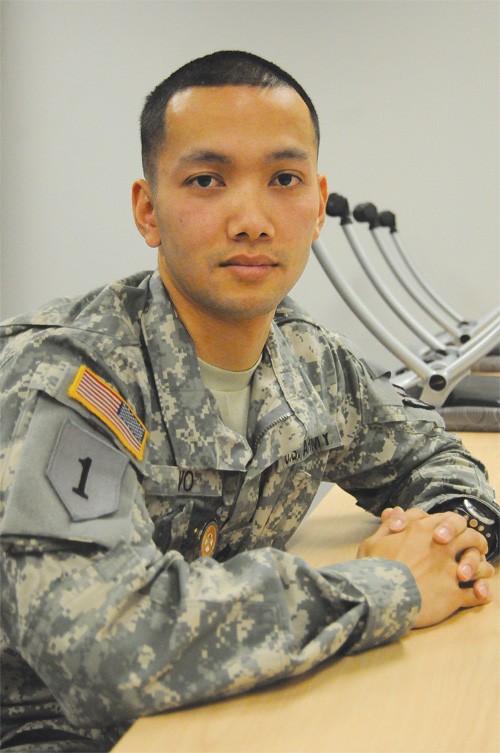FORT LEE, Va. (Jan. 20, 2011) - Five months ago, Sgt. Thang Vo decided to showcase his skills in an effort to become a member of the exclusive Sgt. Audie Murphy Club. Membership in the club wasn't particularly a goal for the Ordnance School instructor, but he figured, "Why not'" He was already a competitor in a number of NCO of the month contests prior to his SAMC board appearance, so the train-up for a similar event would be no big deal.
"I studied almost every day, every chance I got," said Vo, noting it took him three months to prepare. "I would study after my squad leader time, after PT and I took a little time off as an instructor."
He also endured several mock boards with the help of his supervisor, brigade command sergeant major and others who had his best interests at heart.
On the day of the board appearance, Vo confidently stepped toward a seated panel of stern-looking senior NCOs, rendered his salute to its president and calmly went about his business for nearly three hours. He felt he had submitted a worthy performance; one that would eventually earn him that distinctive gold medallion and its accompanying powder blue ribbon.
"I felt good," said the 27-year-old power generation equipment repairer. "I felt like I accomplished something big, the biggest accomplishment since I've been in the military; bigger than anything."
But it wouldn't be his biggest. That distinction belongs to the journey that lifted him from the throes of poverty in Southeast Asia through a melting-pot Southern California community and finally to life as a Soldier in the Army, who has earned one of its greatest distinctions.
Vo's life began in the Quang Nam province of the former South Vietnam. The city where he lived, Tam Ky, featured scenes of rice paddies, oxen, crumbling buildings and a landscape dotted with pedestrians riding bicycles and wearing sandals. In the early 1990s, communist Vietnam was still recovering from the war with the United States and many of its residents were impoverished. Vo said his family - father, mother and two brothers - lived on rice and a "payday" ration of one piece of meat roughly twice a month. Those thoughts produce a rush of emotion in Vo that hints at the mental scars that resulted from episodes of hunger and indignation.
"I think about how my parents lived through it," he said, restraining himself.
Vo was 8 years old when his family moved to the United States. His father was a former officer in the South Vietnamese Army who applied for asylum after he served in the Vietnam War. When Vo was told he was going to America, his reaction was tantamount to a shrug of one's shoulders.
"They said it would be a good life," he recalled, "but what is a good life'"
There was no measuring stick, of course, because all he knew was the meager existence that his family carved out under communist rule. The family prospects for a more fruitful life changed when they arrived in El Monte, Calif., a northwestern suburb of Los Angeles. To a child who had only seen the Third World, a bedroom community in LA looked to be other-worldly.
"It was definitely more city life," said Vo. "In Tam Ky, everybody rode around on bikes, no cars, but in El Monte, there were cars everywhere. And everything was so clean and organized. I was like, 'Wow.'"
The cultural aspects of American life were different as well. A young Vo especially noted a difference in respect toward the elders; no one bowed their heads when they spoke to them or used respectful words toward them in conversation as they did in Vietnam.
"Everybody here talked to everybody else straight-up," said Vo, pointing out how direct everyone was. "In Asian culture, we have different words that we use for the elders. Everybody here is like, 'Come here, you.' People here talk that way to everybody. In Asian culture, if you use the word, 'you,' that means that you disrespect the elders."
Everywhere he turned, Vo was fighting the battle of transition. It was a streaking blur of new schools, traffic, television, video games, supermarkets and malls. On top of that, he had to deal with all types of people and customs that are typical of Southern California. He especially remembers his relationships with the gangbangers he calls "chollos." They were the vanguards of racial division that perpetuated a longstanding discord between his kind and others.
"In high school, there was always this conflict between the races - Hispanics and Asians," he said. "Me, I was in the middle because I was on the basketball team. I dealt with everybody."
Vo's broadmindedness and his ability to integrate lessened his cultural shock. It also set up a consideration to join the military. That was in direct opposition to the wishes of his parents, who saw their son as a symbol of their transition to this country and the bountiful opportunities it presented. Vo also knew that his parents feared for his safety in the worst way.
"They wanted me to go to college and become something like a doctor or lawyer," said Vo.
Nevertheless, Vo had something else in mind. In his heart, he needed to make a payment to the U.S. government, one that would express an immeasurable gratitude for opening its arms to a family left weary by the hand of communism. He made the decision to join the Army.
"I had to give something back to the U.S. for taking in our family," said Vo.
The decision was an easy one but breaking the news to overprotective parents wasn't. His parents both carried emotional scars of the husband's 10 years in a prisoner of war camp and were mindful of the heavy fighting taking place in the Middle East. It would be a stealth move on his part.
"I joined the Army three months out of high school," said Vo of his enlistment in 2003 as an 18-year-old. "I didn't tell them until a week later. I said, 'Mom, I'm going to basic (training).
"I soon as I did, they started crying."
Vo continued to hide information from his parents, including his first deployment to Iraq in 2003.
"I didn't tell them at all," he recalled. "I lied to them the whole deployment. My mom gets sick when she worries, so I told them I was in training. At least she didn't have to worry for a whole year."
Vo informed his parents when he deployed to Afghanistan in 2007. "They were better about it," he said. He's better about it, too. Vo said he loves the life of a Soldier and wants to make it his life.
"I made up my mind after my reenlistment," he said. "I'm going to retire from the Army."
In the meantime, he's serving himself with numerous achievements. He said he owes his accomplishments thus far to those who developed him as a warrior.
"I wasn't a high-speed Soldier when I first came in," he said. "But I had good mentors who set me on the right path - 'You don't live in your parents house anymore; You're in the Army now; Do the right thing' - all that stuff. So far, so good."
So far, indeed. Vo is considering warrant officer school and other opportunities. He isn't exactly sure what the future holds, but he knows he wants to aim for the bigger and better; work with Soldiers, shape them as he was and "serve in the Army until I can't walk."
Consider that statement an assertion that gratitude may be the root of his service but love of duty is the impetus for his success.


Social Sharing